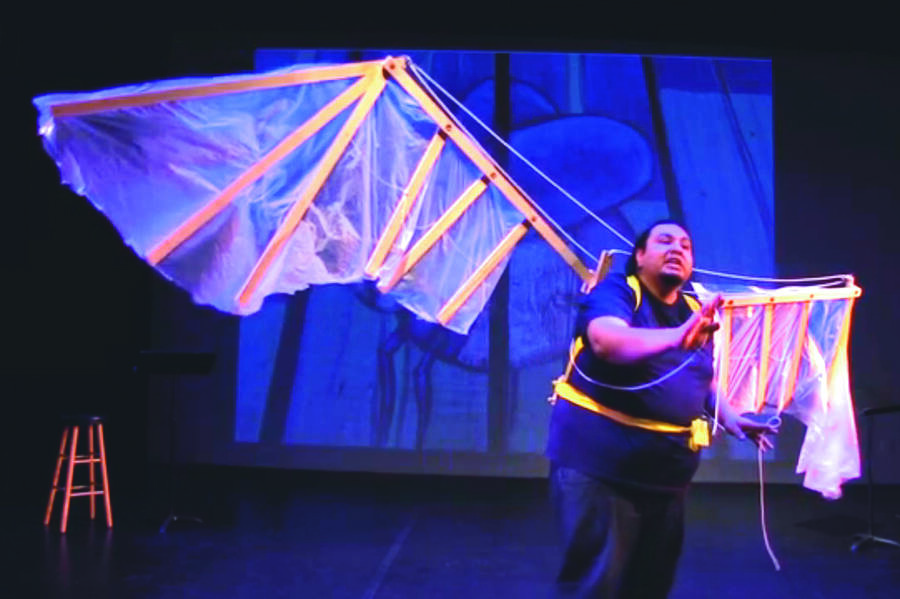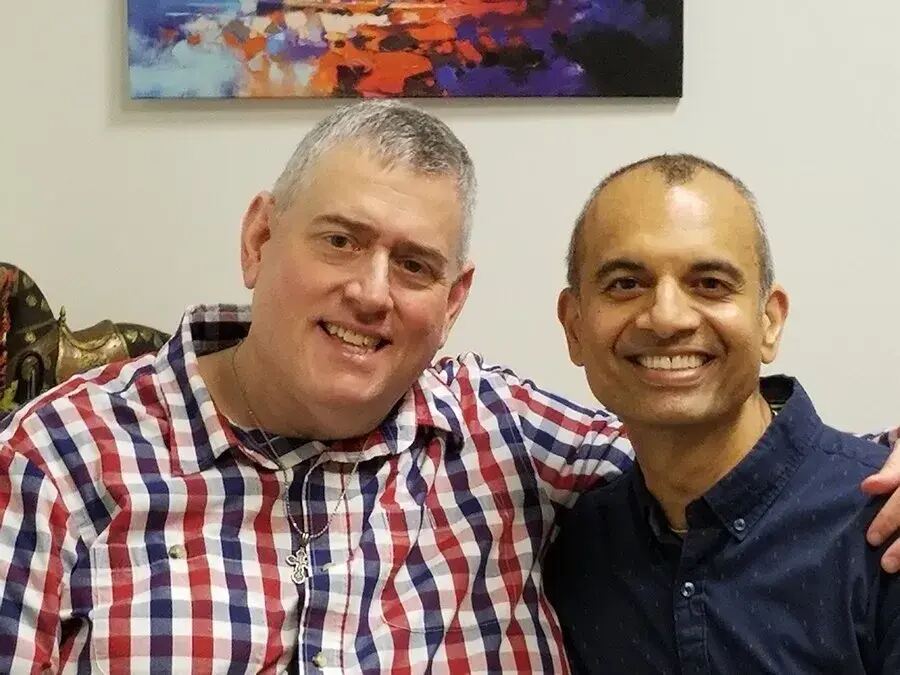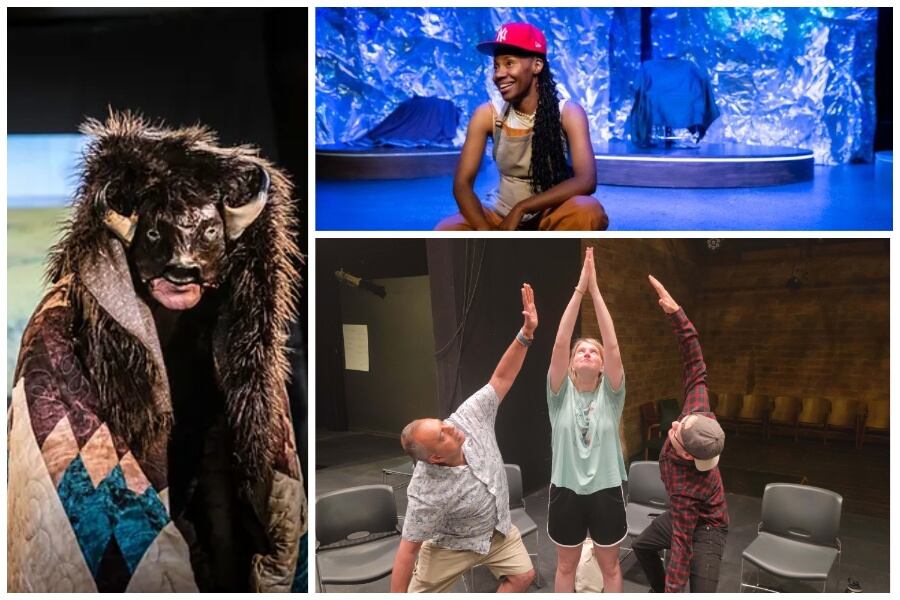Editor’s Note: In partnership with the Doris Duke Foundation and the Sheri and Les Biller Family Foundation, TCG’s THRIVE! Uplifting Theatres of Color initiative offered $1,140,000, equaling 46 grants in 3 categories, to U.S.-based (including Tribal lands and Territories) Black Theatres, Indigenous Theatres, and Theatres of Color (BITOC). In addition to the funds, 21 BITOC receiving RECOGNIZE category grants also participated in REBUILD, a learning cohort working with BIPOC consultants to strengthen their effectiveness in specific areas. The initiative was created with an advisory committee of 14 BIPOC theatre leaders and artists. To further uplift these companies, American Theatre magazine approached myself (Regina Victor, editor of Rescripted) and fellow cultural critic Jose Solís to curate and edit six articles highlighting the RECOGNIZE companies, with each of us guiding three pieces. It was our work to divide and then re-thread these companies together into articles with common themes, source writers and assign them, and edit their drafts, with American Theatre seeing to the final copy edit. These stories are examined through the lens of this year’s critically focused Rising Leaders of Color cohort (Amanda L. Andrei, Citlali Pizarro, and afrikah selah), as well as three Chicago-based writers (Dillon Chitto, Madie Doppelt, and Tina El Gamal). This six-part essay series showcases 21 examples of people doing the work, championing their culture, and finding creative solutions to generational problems. Thank you to Jose for being a wonderful thought partner in this project, and to Emilya Cachapero and Raksak Kongseng for your invitation and support.
Unrestricted support. Support without expectation, or conditions.
This is a foreign concept to most theatres that identify as Black, Indigenous, or Theatres of Color (BITOC), as well as to most theatre leaders of color. So many of us have grown accustomed to a dysfunctional system of philanthrocapitalism, upon which the future of our organizations, and therefore our legacies, are hinged. Philanthrocapitalism is a philanthropic approach that mirrors how business is done in the for-profit world. The Berkeley Economic Review defines it as “different from traditional forms of philanthropy because it involves a capitalist, market-based, for-profit approach to solving the world’s biggest and most pressing issues.” It also leads to the establishing of philanthropic LLC’s, like the Chan Zuckerberg Initiative, which are rapidly replacing private foundations.
There is a complex range of strengths and challenges to this methodology, but one of its challenges is that in order to receive more money, you must provide more output. More shows. More metrics. Rather than encourage theatres to work toward deeper and more sustainable work, this system pushes for measurable content. But anybody who loves the arts knows we often work in a subtler space: that of the immeasurable, and the profound.
Fundraising is cyclical, much like the nature of cultural continuation in theatre. In cycles, there is an invitation for intention, iteration, and evolution. This piece explores the funding cycle’s impact on, and the ingenuity of, the work of three theatres: Silk Road Rising, Pangea World Theater, and Penumbra Theatre.
My experience as a leader includes having been an executive leader of a storefront theatre in Chicago through the height of the pandemic, co-founding a SWANASA (South West Asian, North African, South Asian) community organization, and currently serving on the board for the League of Chicago Theatres. These experiences provide me with insight into fundraising at its most liberating and its most oppressive. I am dedicated to healing this relationship, and envisioning what we could accomplish if funders supported us without restriction.
Unrestricted support is funder-to-fundraiser jargon for “you can use this money however the hell you see fit—we trust you.” What is more healing than trust? I seek this healing and this trust for all theatres, but specifically those built from a place of community. My community has shown unrestricted support when it comes to investing in artists like myself. Upon reflection, it is BITOC theatres like Silk Road Rising in Chicago that have gifted me with unrestricted support and investment as a person, artist, and community leader.
In fact, Silk Road was the first professional theatre that hired me. I was still in college. At the time, I was cast in a show at my university, and there were some schedule conflicts between the two opportunities. My professor encouraged me to drop the Silk Road show, saying that I would be on heavy rotation with them once I graduated because of my talent and identity, and that I didn’t have to start right away. But I didn’t drop the show, and I am so glad I kept that commitment, as my professor was right about one thing: They continued to invest in me as an artist well beyond that first show.
As co-founder and co-executive artistic director Malik Gillani says of the company, “We aren’t just driving our own progress, we’re playing a crucial role in the transformation of the theatre sector to one that actually looks like America. THRIVE! strengthens the ecosystems that make such transformation possible.” Gillani also spoke about Silk Road Rising’s upcoming partnership with Filpino American playwright Karissa Murrell Myers, in partnership with Northeastern Illinois University. Theatres such as these are transforming the sector (and the world) by investing in the next generation of BIPOC theatre artists both in and out of their diasporas, thus creating a legacy.

The cyclical nature of funding, when ethically applied, as with the RECOGNIZE! grants, can be leveraged to the benefit of cultural continuation and community work, through creating a culture of intention and deepening the work already happening. Pangea World Theater creates legacy by channeling funding toward programs such as the Indigenous Voices Series, which “was created in 2001 to highlight the diverse, contemporary work of Indigenous theatre and performance artists. Indigenous Voices continues to bring local, national and international Indigenous artists to audiences in the Twin Cities.”
Pangea has a stunning digital archive of 18 years of this work. Their innovative arts programming also includes Race North and South on the Great River, a creative forum for community members and youth from many diverse communities to dialogue about issues of race and its intersections. These approaches are the kinds of imaginative programming that can further blossom with unrestricted funding like that of the RECOGNIZE grants.
“The THRIVE! grant has afforded us the opportunity to explore new modes of breaking artistic silos and expanding our definition of theatremaking,” said Jamil Khoury, co-founder and co-executive artistic director of Silk Road Rising, which plans to rebrand as Silk Road Cultural Center in early 2024. “This shift will enable us to continue producing live and digital theatre, but also to engage with visual art, literature, music, dance, comedy, food, etc. We’re looking at the connectivity and interplay within and between artistic mediums. It’s how we continue to serve our Silk Road communities and honor our commitment to expanding the American story.”
Like Silk Road, Penumbra continues to build a legacy of healing and cultural continuance. They, too, are “evolving into [their] next life cycle: a performing arts campus and center for racial healing that nurtures Black artists, advances equity, and facilitates wellness for individuals and community,” according to the theatre’s website. “Our space will center the Black experience, learn from and support people of color who are not Black, and welcome white individuals interested in building resiliency and competency for racial equity and racial healing work. Penumbra will stand in solidarity with and support indigenous communities upon whose land the work is located.”
Penumbra Theatre’s contributions to cultural continuation are not only seen in the award-winning work on their stages, which is “artistically excellent, thought-provoking, relevant and…illuminates the human condition through the prism of the African American experience.” It is also beautifully symbolized in the transfer of this culturally specific and necessary theatre from a father to a daughter, as Sarah Bellamy, president of Penumbra Theatre, continues the artistic legacy of her father, Lou Bellamy, Penumbra’s founder and current co-artistic director.

Often these brilliant initiatives are made possible with little more than a shoestring budget and a big dream. As a storefront theatre leader, this is how I got most things done. However, these big ideas can really flourish when funded by a philanthropic system that trusts and invests in the implicit knowledge held by BIPOC leaders who are in constant contact with their communities. It is this deep community expertise from which Penumbra’s newest program, PRIDE (Positive Racial Identity Development and Empowerment), blossoms.
As Khamara Pettus, Penumbra’s development director explained, PRIDE “will combine arts, equity, and wellness for the benefit of youth. The PRIDE program is…designed to support children of all races as they learn about concepts and experiences of race, identity, and social justice. Primary beneficiaries are youth ages 2-22 and their families. PRIDE is unique in that it supports a child’s journey through adolescence with racial and cultural pride, a nuanced knowledge of history, and practical skills to build resiliency, self-esteem, and a sense of community and belonging.”
PRIDE secured $1 million in funding from the U.S. Department of Education through the FY 2023 congressional bill—a level of government support that shows trust in BITOCs to venture into new territory. When BITOC are empowered to follow their impulses, take risks, and center the needs of the communities they work with, magical things can happen.
Silk Road co-artistic director Malik Gilliani says that support from THRIVE! has enabled his work on a new piece called The Art of Aphasia. Aphasia is a neurological condition that can affect the parts of the brain associated with language. The new piece, said Gillani, “showcases my ongoing recovery from a post-stroke language disorder, aphasia, and the interconnectedness of art and neuroplasticity. With the help of THRIVE!, we’re building a new genre of theatre called Aphasic Theatre that centers the experiences of people like me and draws inspiration from Theatre for the Deaf and Theatre for the Blind.” He added, “It’s important to note that as a brown, South Asian, Muslim, immigrant, queer, disabled person, my story is a Silk Road story, and it expands the representation of Pan-Asian, North African, and Muslim peoples.”
If funders continue to move in this direction, looking to theatres like Silk Road, Pangea, and Penumbra as our guides, we have a chance to heal a struggling financial system while also healing our communities and ourselves. Unrestricted funding can help ensure that these theatres and the legacies they hold will persist, and create a beautiful cycle of cultural continuance and living ancestors. Unrestricted investment invites Black, Indigenous, or Theatres of Color (BITOC) and their leaders to be similarly unrestricted in their imagination, in their paying it forward, and in their investment in their communities.
Tina El Gamal (she/they) is a Chicago-based theatre artist, educator, and administrator. She was featured on New City Stage’s Players 50, 2022.
Want to learn more about the THRIVE! grant recipients? Check out this new video featuring them here.


